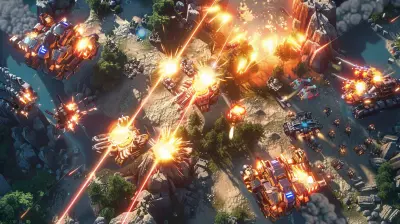Harnessing the Power of Social Games for Team Building
10 August 2025
When you think of team-building activities, what’s the first thing that comes to mind? Trust falls? Awkward icebreaker games? A long day in a conference room listening to motivational talks? Honestly, that’s not exactly my idea of a good time—or anyone else’s for that matter. But here’s a fresh, fun, and genuinely effective alternative: social games. Yep, the ones you might already be playing for fun with friends. What if I told you that playing these games isn’t just entertaining, but could also strengthen team dynamics? Too good to be true? Let’s dive in.
What Are Social Games?
First off, let’s clarify what we mean by "social games." These are multiplayer games designed to be interactive and engaging, often fostering collaboration, communication, and problem-solving. Some are played online, while others live in the real world—think board games, trivia games, or even those quirky party games like charades.Social games are inherently collaborative (or occasionally competitive). They're designed to bring people together, spark creativity, and most importantly, inject a healthy dose of fun into any interaction. From classic games like Monopoly to modern-day digital gems like Among Us, social games have something for everyone. But beyond the laughs and good times, they hold serious potential for improving how teams work together.
Why Social Games Work for Team Building
Okay, so why social games? What makes them so special when it comes to team building? Let me break it down.1. Encourages Natural Communication (No Cringe Small Talk)
You’ve been there—we all have. Forced networking events or team-building seminars where you’re asked to share "fun facts" about yourself that somehow make everyone feel even more awkward. Social games, on the other hand, effortlessly encourage communication. Even the quietest team members will find themselves speaking up when they’re solving a puzzle in an escape room or trying to bluff their way through a round of Werewolf.By focusing on the game itself, people stop worrying about how they’re coming across and start collaborating naturally. It’s less about forced interaction and more about shared experiences.
2. Breaks Down Hierarchies
Here’s the thing: traditional office dynamics can unintentionally create barriers. Managers stick with managers, and entry-level employees might hold back from fully participating. But when everyone’s thrown into a game together, the playing field levels out. Suddenly, it’s not about job titles—it’s about working together to outsmart the other team in trivia or survive the zombie apocalypse in Left 4 Dead.Playing games together reminds everyone that we’re all just people. And sometimes? That’s exactly what a team needs to start working better together.
3. Boosts Problem-Solving Skills
Almost every social game out there challenges players to think critically and solve problems. Whether it’s figuring out who the imposter is in Among Us or strategizing the best way to conquer your opponent’s territory in Risk, these games train your brain. When teams tackle these challenges together, they’re strengthening their problem-solving muscles—skills they can take back to their work projects.And let’s face it: practicing problem-solving feels a lot more enjoyable when it involves dragons, clues, or colorful cards instead of spreadsheets.
4. Strengthens Team Bonds
You know that feeling when you win a hard-fought game as a team? The high-fives, the laughter, the shared sense of accomplishment? That’s the kind of connection that social games can foster. Working together to achieve a goal (even if it’s something as silly as collecting the most sheep in Catan) creates trust and camaraderie. It’s like building inside jokes that only your team gets, making your bond stronger than ever.
Best Types of Social Games for Team Building
So now that I’ve got you excited about the idea of using social games for team building, you’re probably wondering: where to start? There are SO many options, but I’ve rounded up some of the best types of social games that are perfect for bringing teams closer.1. Collaborative Board Games
Collaborative board games are all about teamwork. Games like Pandemic, where players must work together to stop a global outbreak, force teammates to plan carefully, share resources, and communicate effectively. It’s the perfect metaphor for a workplace project—except, you know, with slightly less global catastrophe.2. Online Multiplayer Games
For remote teams, online multiplayer games are gold. Platforms like Jackbox Games let everyone join in via their smartphones, making participation ridiculously easy. Games like Quiplash (where players answer prompts in the funniest way possible) are not only hilarious but also great for breaking the ice.If you’re into something a bit more strategic, don’t sleep on games like Among Us. It’s basically a digital whodunnit where teamwork and quick thinking reign supreme. Plus, there’s nothing like the chaos of accusing your coworker of being the imposter to break the tension.
3. Trivia Games
Everyone loves to show off their random knowledge, right? Trivia games are fantastic for team building—they encourage collaboration as teammates pool their knowledge to answer questions. You can even customize trivia to focus on your team’s shared interests for an extra personal touch.4. Escape Rooms
Okay, this one’s a bit outside the box, but if you’re looking for an in-person option, escape rooms are unbeatable. Locked in a room with only clues to guide them out, teammates have to communicate, strategize, and think under pressure. It’s challenging, exciting, and perfect for building trust.
Tips for a Successful Social Games Team-Building Session
Not all team-building efforts are created equal, and that goes for social games too. Here are a few tips to ensure your game session hits it out of the park.1. Know Your Team’s Personality
Is your team made up of introverts who might shy away from the spotlight? Or a group of extroverts who thrive on competition? Choose games that suit their comfort levels. For example, trivia might work better for quieter teams, while charades might shine with a more outgoing group.
2. Keep It Inclusive
Avoid games that might alienate anyone—whether it’s because they’re overly complicated, require specific knowledge, or revolve around humor that not everyone might get. The goal is to bring people together, not leave anyone feeling left out.
3. Don’t Force It
This one’s big. Nobody likes being made to participate in something they’re not interested in. Offer games as an option and frame them as a fun activity, not a mandatory chore.
4. Give Everyone a Shot at Success
Make sure every participant has the chance to show their skills—whether it’s coming up with clever ideas, leading a team, or just cracking jokes to keep the vibe light.
Final Thoughts
Team building doesn’t have to be a tedious box to check off your to-do list. With social games, it can become something your team genuinely looks forward to. Whether it’s through solving puzzles, crushing trivia, or working together to save the virtual world, these games can help foster communication, trust, and a sense of belonging.The best part? Social games remind us that, at the end of the day, it’s okay to let loose and have some fun—even at work. After all, teams that play together really do stay together. So grab your dice, log in, or dust off that trivia set. It’s time to harness the power of social games and take your team-building game (pun intended) to the next level.
all images in this post were generated using AI tools
Category:
Social GamesAuthor:

Emery Larsen
Discussion
rate this article
2 comments
Georgina Phelps
Teamwork + Fun = Success!
December 18, 2025 at 5:36 AM

Emery Larsen
Absolutely! Social games foster collaboration and enjoyment, driving team success.
Rowan Erickson
Engaging synergy through play!
August 18, 2025 at 2:59 PM

Emery Larsen
Thank you! Play truly fosters collaboration and creativity in team building.


